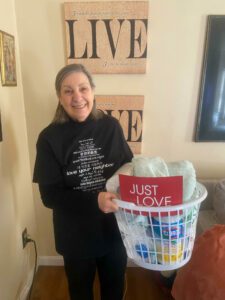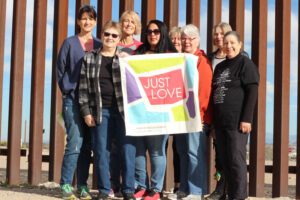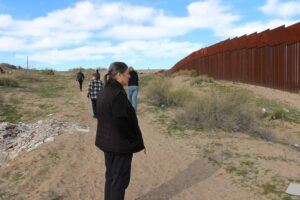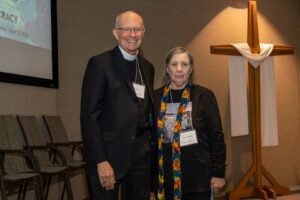 “Always remember OP.” That was Lois Griffiths’ mother’s code for “other people.” From a young age growing up in Harrisburg, she has taken her mother’s words to heart, and has lived a life directing not only her actions toward “OP,” but centering the needs and experiences of others in her advocacy.
“Always remember OP.” That was Lois Griffiths’ mother’s code for “other people.” From a young age growing up in Harrisburg, she has taken her mother’s words to heart, and has lived a life directing not only her actions toward “OP,” but centering the needs and experiences of others in her advocacy.
Griffiths grew up on Market Street in Harrisburg as the oldest of four children. They lived next door to the Catholic rectory, and often those who sought food and other resources from the priest would end up asking for help at their house as well.
“I think they liked my mother’s baking…and there was always enough to share.” She also remembers a white bench in front of their house, where many mornings they would leave for school and see someone sleeping there. The generosity of her family in sharing food and creating a safe space for all stemmed from their Lutheran faith. For her mother, the Bible was “a book of love and hospitality.”
Her youth was also shaped by the diversity of the neighborhood she grew up in. In addition to the neighbors at the rectory, Griffiths grew up among Jewish neighbors and African American classmates. She says that when she was in high school, it felt as if the school reflected the community and the nation. After she graduated, she trained as a teacher and went back to teach at that same school, keeping a promise she had made to the principal to do so.
For the next 27 years, Griffiths taught and saw the school’s minority population increase, along with students for whom English was their second language. She taught English primarily, but also valued the freedom and opportunity to teach a variety of electives that allowed her and her students to engage with the world and one another in different ways. From conflict resolution and peer mediation to student council and incorporating community engagement, she instilled in her students a similar sense of responsibility and care for “OP” that helped them gain skills and a worldview far beyond the classroom.
Griffiths also credits her time teaching with being one of the first avenues of advocacy she pursued. Nearly three decades of educational experience made her keenly aware of the state of education funding, and the inherent inequities throughout the system. Teaching a diverse population in Harrisburg, she also witnessed first-hand insidious and all-too-frequent racial disparities. One of her earliest interactions with Lutheran Advocacy Ministry in Pennsylvania (LAMPa) was meeting with legislators working for quality education and fair school funding.
Connecting to the Wider Church and World
Griffiths connected with LAMPa after she retired and decided to go to her congregation’s Women of the ELCA (WELCA) chapter. Though she was born and raised Lutheran, she had never engaged with the group before, but she went bravely “to see what was up.” At that time, what was “up” was a trip to Chicago for anti-racism training. Griffiths jumped at the opportunity. She came back from that initial training ready to hit the ground running, and immediately found those who were also passionate and excited to work for racial justice – joining the United Church of Christ’s racial justice committee and then forming one in the Lower Susquehanna Synod (LSS). She also not only became a stalwart advocate with LAMPa, but also with the Pennsylvania Council of Churches and the Friends Committee on National Legislation. She was intrigued by and has continued to appreciate WELCA’s purpose statement as in harmony with her own worldview: “We are called to discipleship to promote healing and wholeness in the church, the society, and the world.”

Photo credit: Women of the ELCA/Elizabeth McBride
That “cold call” visit to WELCA began Griffith’s long engagement with women’s ministry organizations at the congregational, local, and synodical level. She has served as president for her synod chapter and Harrisburg’s Church Women United. Such positions have allowed Lois to continue to learn about other issues and programs that the ELCA offers, broadening her perspective beyond her town and synod. In 2019, during the family separation crisis at the border, Griffiths said she there were “many sleepless nights and tears for me just watching news reports.” As she attended the WELCA Synodical Presidents gathering in Chicago, their first workshop was about AMMPARO – Accompanying Migrant Minors with Protection, Advocacy, Representation and Opportunities. There, she was connected to an opportunity to put her grief and anger into action by going to the border in February of 2020. Griffiths calls the trip “a biblical ‘Come and see’ moment,” saying, “I couldn’t NOT go.”

Photo credit: Women of the ELCA/Elizabeth McBride
At the border, Griffiths encountered many new OP—from immigrants sharing their stories, to people of faith accompanying those who had crossed the border, to Gettysburg students embodying their generation’s commitment to advocacy and action. She left that trip filled with hope, and with admiration for those who had made the trek across the border.
“As horrific as everything was, when we heard people’s stories, all they were thankful for was being able to provide for their family,” she said. Despite the hell they went through, their faith was even stronger.”
As it may be clear, while she loves her church and Lutheran faith, Griffiths is ready and excited to engage others across faiths in the work for justice. The diversity of her childhood community prepared her to see the gifts many different traditions bring — not only to interfaith dialogue, but also in the joint work of advocacy. She also loves learning about and from other traditions and is especially thankful for attending Jewish-Christian dialogues that have expanded her own understanding of Scripture.
Sister Sadie and Prison Ministry
The story of Griffith’s advocacy and care for others would be incomplete without her sister, Chaplain Sadie Pounder.
“She was my younger sister, but she was my hero.” Pounder had a passion for working with the incarcerated; she moved often because of her husband’s work and always found a way to offer counseling in the local prison, no matter where they were located. When they settled in Gettysburg, Pounder wanted to pour her effort into prison ministry, and asked her sister to join her. Griffiths, of course, said yes, and together they created a ministry that not only walked with the incarcerated and those transitioning out, but also empowered congregations to support and advocate. They wrote the TOSS brochure – Take One Small Step – helping congregations find practical resources for accompanying returning citizens. Among the ideas in that brochure is a project called “Baskets of Love,” in which laundry baskets are filled with home and personal-care items and distributed to those transitioning into a new phase, often without those essentials.
Griffiths commitment to prison ministry is not just based on acts of service to individuals, but also shaped by her understanding of systemic injustices that necessitate systemic actions. She asks, “Who’s incarcerated? Who’s a part of the system working against them?” Once again, this led her to working with the Friends Council on National Legislation; “I just walked in cold and said ‘Hello,’” said Griffiths, leading her to find those who were asking similar questions and were on a similar path of seeking justice.
Today, Griffiths continues the work she and her sister started by working on addressing inhumane conditions at the Dauphin County Prison.
Advice to Advocates Today
Griffiths reads a daily devotional of the works of Dietrich Bonhoeffer.
“Somehow I found Bonhoeffer while Sadie was in seminary…while she was writing papers about him, I was reading all I could.” Her devotional is accompanied by a bookmark also with a quote from Bonhoeffer, that summarizes her own convictions – “The test of the morality of a society is what it does for its children.” Though she would balk at the comparison, her life of advocating for justice and caring for all of God’s children places her in a line of Lutheran public witnesses along with the likes of Bonhoeffer.
 When Bishop James Dunlop presented Griffiths as LAMPa’s 2023 “Serve.Pray.Speak” honoree from Lower Susquehanna Synod, he said she “has been a steady presence, a constant and consistent voice, a stalwart advocate for justice and equality, a humble warrior fighting to end prejudice and hatred, a diligent agent of change both communally and individually for someone who just needed some help or a new start in life.”
When Bishop James Dunlop presented Griffiths as LAMPa’s 2023 “Serve.Pray.Speak” honoree from Lower Susquehanna Synod, he said she “has been a steady presence, a constant and consistent voice, a stalwart advocate for justice and equality, a humble warrior fighting to end prejudice and hatred, a diligent agent of change both communally and individually for someone who just needed some help or a new start in life.”
Griffiths does not consider her work to be anything extraordinary, saying simply, “I’m on humanity’s side.”
“Injustices have always made me angry,” she said. “Advocacy is a way to put my anger into something.” Griffiths said she believes that all people can learn how to channel their own energy, anger, passion, and care for others into advocacy. And she also makes sure to give the advice to those new to advocacy that “you have to be there for the long haul. One detour doesn’t mean you won’t make it to where you want to be.”
After decades of doing this work, she has seen major movement in some areas and precious little in others. Her advocacy through LAMPa has yielded progress on human trafficking, housing, predatory lending, criminal justice reform, health care and hunger funding, to name just some of areas where her faithful voice, joined with others, has made a difference — even if there is still work to do.
“It’s hard to try to keep the faith, but you can’t stop.” Even when outcomes seem impossible, Griffiths said. “Advocacy is the right solution because you’re going to the people in power.”
Griffiths is “a-force-to-be-reckoned-with” according to her bishop, and presumably, any legislators who have encountered her in her work for justice. From her roots of a warm and hospitable home, to sitting with immigrants in a shelter on the border, to speaking truth to power in concert with the incarcerated, Griffiths embodies the joy and hope of an advocate rooted in her call as a disciple of Jesus and beloved child of God. She continues to work for justice and to inspire us to do the same.





